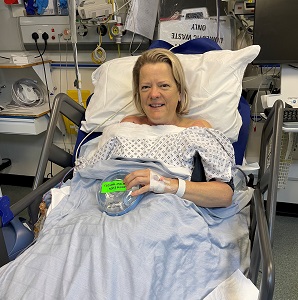27 January 2022
 Frimley Health is the first trust in the UK to use pain pumps for breast cancer patients, allowing them to go home on the same day as their surgery.
Frimley Health is the first trust in the UK to use pain pumps for breast cancer patients, allowing them to go home on the same day as their surgery.
The use of the pain pumps has seen 73% of patients who have had mastectomies discharged within hours of the procedure.
The Trust has paved the way for other hospitals in the UK and is now nationally regarded as a centre delivering high quality regional anaesthesia and pain management.
Recognising the opportunities for high quality, advanced regional anaesthesia fellowship training as a result of using such innovative techniques, Frimley Health was accredited and awarded the status of an approved training centre by the European Society of Regional Anaesthesia (ESRA).
It’s another example of how the Trust is committed to continually improving quality and outcomes for patients – one of its key strategic ambitions.
The anaesthetics department has worked in collaboration with Frimley Health’s consultant breast surgeons and the pain management team to support the use of the pain pumps.
Consultant anaesthetist Dr Madan Narayanan was the driving force behind the use of this technique for breast patients.
He said: “The pain pumps have been used in hospitals in the US for breast surgery with great success and since we introduced them at Frimley Health the results speak for themselves.
“The feedback from patients has been extremely positive. Through the simple insertion of a catheter that delivers continuous local anaesthetic direct to the site, they can recover at home rather than staying in hospital.”
The catheter is inserted during the final stages of the breast surgery and is attached by a thin tube to a portable circular device. The device effectively pumps the local anaesthetic via a balloon-like structure to ensure patient get the correct amount of continuous pain relief for three days post-surgery.
The use of pain pumps in breast surgery was first introduced at Frimley Health in November. This week, the pump was used for the first time on a patient who had both a mastectomy and reconstructive surgery, which usually requires a longer stay in hospital.
Gill Church, 52, from Fleet, Hampshire, said she “felt amazing” just an hour after the surgery.
She said: “It’s incredible to think that I can now go home and, apart from a bit of discomfort under my arm, I can’t feel any pain.
“I’ve got my husband at home and my daughter who has come home from university for a couple of days to see me. I can rest up and have them by my side.
“My biggest worry is actually stopping myself getting up and doing things around the house as I feel fine!”.
The average stay in hospital for this type of breast surgery is usually between one and three nights depending on whether the patient has also had reconstructive surgery.
Before the treatment was introduced only 6% of patients went home on the same day post-surgery and that has now increased more than ten-fold.
Mrs Isabella Karat, consultant oncoplastic breast surgeon, said: “The initiative followed one of the learnings from the GIRFT [Getting It Right First Time] programme which looked at tackling the barriers to discharge.
“One of the most common reasons was post-operative pain and that is certainly the case with breast surgery.
“The majority of patients feel well post operatively and by using the pain pump any discomfort is kept to a minimum.
“Patients can recover in the comfort of their own home and receive the same level of pain management as they would in hospital.”

